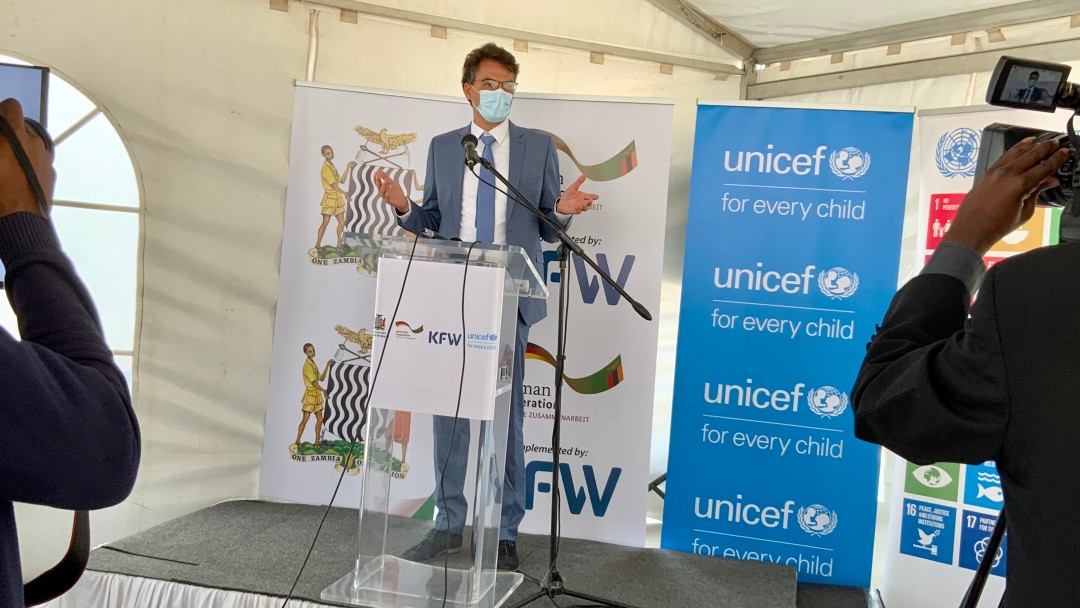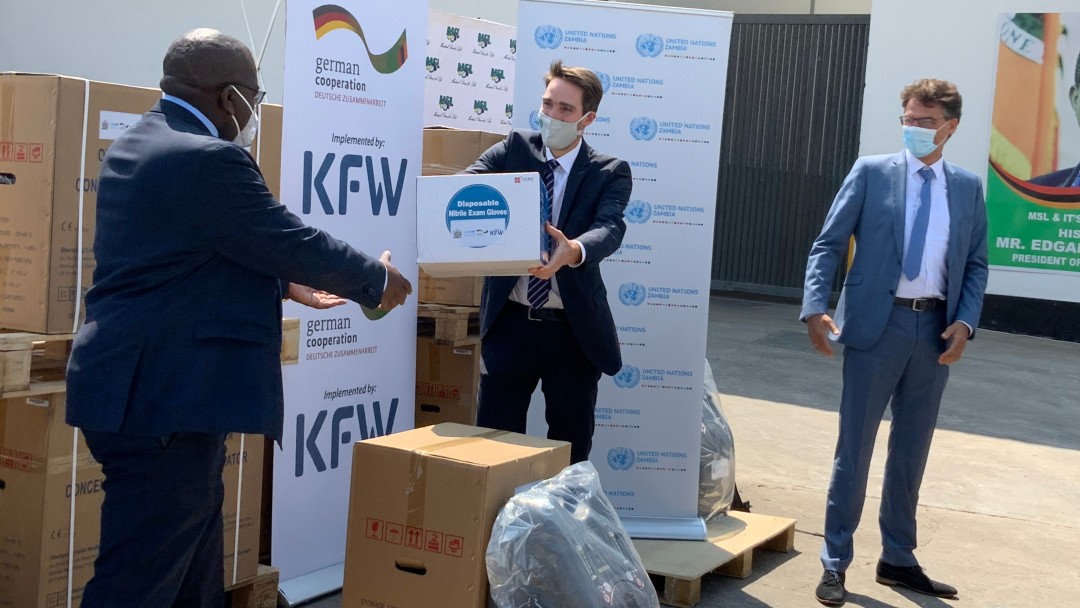News from 2020-09-09 / KfW Development Bank
Rapid COVID-19 support for Zambia

On behalf of the German government, KfW Development Bank is supporting the containment of the corona pandemic in Zambia with around EUR 20 million. The funds are being provided under the Corona Emergency Programme of the Federal Ministry for Economic Cooperation and Development (BMZ). The money will be used to strengthen hospitals and in particular the COVID-19 treatment and isolation centres in the country. The drinking water supply will be improved. Families impoverished as a result of the pandemic receive direct financial support.
Corona Aid is the first project that KfW is implementing together with the Ministry of Health of the African country. "We want to help Zambia and the Zambian population to combat the spread of COVID-19 in the country and mitigate the consequences," said Stefan Lutz, head of the KfW office in the Zambian capital Lusaka. KfW Development Bank’s project partner in the country is UNICEF, the United Nations Children's Fund, which receives support from the World Health Organisation (WHO) and in the logistical field in the nationwide distribution via the World Food Programme (WFP).
Experts assume that the pandemic will spread with a delay in the poor African countries, such as Zambia, but that its impact will then be all the more severe due to the insufficiently developed social and health systems there.
As a further step, the Zambian Ministry of Health received extensive protective equipment for medical staff in early September, including half a million surgical masks, 1.3 million pairs of gloves and 260 oxygen concentration devices. The aid supplies will benefit the 1400 health centres, 30 of which specialise in the treatment of COVID-19 patients.

In addition to the protective equipment, 30,000 COVID-19 test kits will be purchased and staff in the ten test laboratories will be trained in the application of the specific corona tests. Experience with this novel viral disease has shown that more testing is needed to contain the spread of Sars-CoV-2. It is true that the number of detected infections is relatively low. However, since an average of 20% of those tested have been positive, it can be assumed that the corona virus has already spread widely in Zambia. The Ministry of Health, however, has only limited testing capacities so far. South Africa, for example, currently tests ten times more people than Zambia in relative terms.
Moreover, KfW Development Bank funds are being used to maintain general health protection: The routine immunisation of: 188,000 infants under two years of age will be ensured and 190,000 pregnant women will be vaccinated against tuberculosis. "We will do everything in our power to support the Zambian government in its action against COVID-19," says Noala Skinner, UNICEF representative in Zambia, "and in doing so we will focus on children and the poor.
The improvement of water and sanitation services in 100 schools and 100 health centres also serves this goal. In 120 village communities, existing wells are to be rehabilitated or new ones drilled. Urban and rural water suppliers will be provided with the chemicals needed for water purification. With BMZ funds, KfW is ensuring the basic drinking water supply for about four million people over a period of at least three months.
In Zambia, too, it is precisely the people who are suffering from the economic consequences of the pandemic, who are already badly off. Restrictions imposed by the government, such as exit restrictions, affect mainly urban families who live from street trading or day labour. If this income is lost, people are left with nothing.
KfW will distribute EUR 8.75 million from the BMZ programme to the particularly needy population groups via UNICEF over a period of six months this year and next year. The cash transfers will be used to top up payments that the government is already making to the poorest parts of the population to around EUR 17.00 per household per month. However, new groups will also benefit from this financial aid, so that they can initially cover their basic needs over the next months of the pandemic.
Zambia, located in the southern part of the African continent, is one of the poorest countries in the world. According to the World Bank, 58% of the people live below the poverty line, which means they have less than USD 1.90 a day. Zambia is twice the size of Germany and has about 18 million people, slightly more than North Rhine-Westphalia.
On behalf of the Federal Government, KfW has supported Zambia with around EUR 900 million since 1965. The investments have mainly gone into improving infrastructure, energy supply and agriculture.

Share page
To share the content of this page with your network, click on one of the icons below.
Note on data protection: When you share content, your personal data is transferred to the selected network.
Data protection
Alternatively, you can also copy the short link: https://www.kfw-entwicklungsbank.de/s/enzBWrMC.CT7A
Copy link Link copied